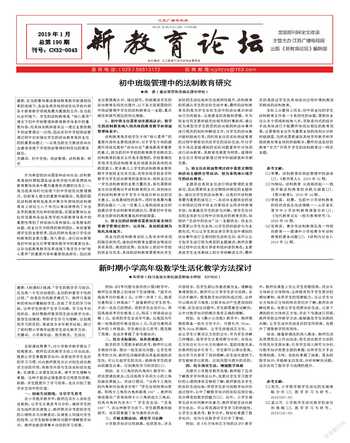Analyzing the Methodology of Teaching Listening in Junior Middle School
许红芬
Abstract:Listening is one of the four skills (listening speaking reading and writing).And listening is the main content during English teaching. However, it is the poorest skill among the four skills. This thesis will analyze the methodology of teaching listening in junior middle school. It consists of two parts: first, the difficulties of listening; second, how to develop students' listening skill in language classroom by various activities.
Key words:listening;difficulty;activity
Ⅰ. The difficulties of listening
As technology advances, and trade and exchanges between countries in crease, it is becoming more necessary to understand spoken English in many situations. There are three major difficulties for students listening skill. They are from the language that we are learning, students' psychology and the content which we are listening.
Ⅱ.How to develop students' listening skill by various activities.
We have known the difficulties in listening and the principles for teaching listening. So, we can find some specific activities during listening to develop students' listening skill. As we all know, listening is a process. Here, we can divide it into three stages: pre-listening, while-listening, and post-listening. In every part, the teachers can design different activities to help the students understand.
1. Pre-listening activities
1.1 Predicting
Some researches in listening has shown that good listeners are good predictors. By helping our students become better predictors, we are helping them become better listeners.
1.2 Setting the scene
The teacher can help provide the background information to help the students. The teacher can collect some photos or albums and so on to help set the scene if they are needed.
1.3 Listening for the gist
Listening for the gist is similar to ask students one or two questions that focus on the main idea or the tone or mood of the whole passage.
2. While-listening activities
The while-listening stage is the most difficult for the teacher to control, because this is where the student needs to pay attention and process the information actively. There are many different kinds of tasks for students to do while they are listening to a message.
2.1 Listen and tick
A large part of what makes a listening task easy or difficult is what the teacher asks the students to do with the material. If all the students need to do is tick items as they hear them, the task will be much easier.
2.2 Listen and act
With beginners, it is easy to with simple commands such as "Stand up." "Sit down." "Walk to the door." "Open the door." etc.
2.3 Listen and draw
This type of activity works very well as an information gap activity between pairs of students.
2.4 Listen and fill
The students can read along while they listen to something and fill in the blanks with the words that they hear.
2.5 Listen and guess
It is helpful to provide a task for the students to do while they are listening. This gives the students a purpose to listen for and helps them focus on the listening itself.
3. Post-listening activities
The post-listening stage is where the teacher can determine how well the students have understand what they listened to, but it is important to design the tasks well.
3.1 Multiple choice questions
The most typical type of post-listening task is the multiple choice comprehension question.
3.2 Answering questions
Instead of multiple choice questions, open-ended questions can be asked.
3.3 Note-taking and gap-filling
This is a good example of how while-listening and post-listening is combined. The students take notes while they are listening. When the listening is finished, the students are given two or three minutes to tidy up the notes.
Conclusion:
Since we are teaching our students English not only to help them pass exams, but also to prepare them to use English in real life . We need to give our students a variety of listening exercises to prepare them for real life use of language. We believe a better understanding of the listening process and the spoken language will help us to understand the difficulties that students experience in developing listening skills.
Reference books:
[1]He Guangkeng, The Basis of English Teaching and Learning Methods, Ji Nan University Press, 1999
[2]Gu Xueliang, The Basic Technical Training in English Teaching, Hangzhou University Press, 1998.
[3]Wilga M.Rivers& Mary S. Temperley, A practical guide to the teaching of English as a second or foreign Language, New York: Oxford University Press, 1978

